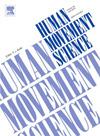Synergy in motion: Exploring the similarity and variability of muscle synergy patterns in healthy individuals
IF 1.9
3区 心理学
Q4 NEUROSCIENCES
引用次数: 0
Abstract
Background
Recent studies suggest that muscle synergy patterns can be a guide for diagnosis and rehabilitation.
Research question
Does human's lower limb synergy pattern significantly change with changes in walking speed? Are there large differences in synergy patterns among different healthy individuals?
Methods
22 healthy subjects from an open-source datasets were included. Non-negative matrix factorization was applied to identify the module composition of surface electromyography(sEMG) data, and the similarity index was adopted to quantify the overall similarity between synergy patterns.
Results
Results demonstrated that healthy individuals have their own intrinsic muscle recruitment and coordination characteristics for locomotion at various speeds, additionally, their synergy patterns exhibit predictability under speed variations.
Significance
This study develop reference synergy patterns for the lower limbs across 28 different walking speeds. The developed synergy patterns and the above findings may guide the study of gait synergy in rehabilitation and assistance.
运动中的协同作用:探索健康人肌肉协同模式的相似性和可变性。
背景:最新研究表明,肌肉协同模式可作为诊断和康复的指导:研究问题:人的下肢协同模式会随着步行速度的变化而发生显著变化吗?不同健康人的肌肉协同模式是否存在较大差异?应用非负矩阵因式分解法识别表面肌电图(sEMG)数据的模块组成,并采用相似性指数量化协同模式之间的总体相似性:结果表明,健康人在不同速度下的运动有其内在的肌肉募集和协调特征,此外,他们的协同模式在速度变化下表现出可预测性:本研究开发了 28 种不同步行速度下的下肢参考协同模式。意义:本研究为 28 种不同步行速度的下肢制定了参考协同模式,所制定的协同模式和上述发现可为康复和辅助中的步态协同研究提供指导。
本文章由计算机程序翻译,如有差异,请以英文原文为准。
求助全文
约1分钟内获得全文
求助全文
来源期刊

Human Movement Science
医学-神经科学
CiteScore
3.80
自引率
4.80%
发文量
89
审稿时长
42 days
期刊介绍:
Human Movement Science provides a medium for publishing disciplinary and multidisciplinary studies on human movement. It brings together psychological, biomechanical and neurophysiological research on the control, organization and learning of human movement, including the perceptual support of movement. The overarching goal of the journal is to publish articles that help advance theoretical understanding of the control and organization of human movement, as well as changes therein as a function of development, learning and rehabilitation. The nature of the research reported may vary from fundamental theoretical or empirical studies to more applied studies in the fields of, for example, sport, dance and rehabilitation with the proviso that all studies have a distinct theoretical bearing. Also, reviews and meta-studies advancing the understanding of human movement are welcome.
These aims and scope imply that purely descriptive studies are not acceptable, while methodological articles are only acceptable if the methodology in question opens up new vistas in understanding the control and organization of human movement. The same holds for articles on exercise physiology, which in general are not supported, unless they speak to the control and organization of human movement. In general, it is required that the theoretical message of articles published in Human Movement Science is, to a certain extent, innovative and not dismissible as just "more of the same."
 求助内容:
求助内容: 应助结果提醒方式:
应助结果提醒方式:


